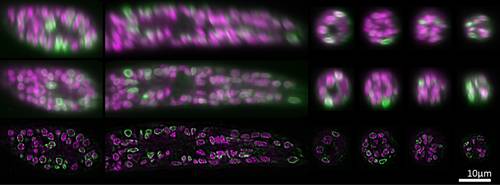
Biologists are never satisfied with the images coming from their microscopes. They always want them sharper, showing more details and less noise. One way to achieve that is of course to improve the microscopy itself. One computational technique, known as deconvolution, has been used to estimate the underlying real image given the imperfectly acquired image and knowledge about the optical properties of the microscope. The results of the deconvolution can be impressive, however it is notoriously difficult to calculate, especially for large three-dimensional images acquired over long periods of time.
Stephan Preibisch from the group of Pavel Tomancak, now working with Eugene Myers and Robert Singer, took a fresh look on the deconvolution technique using data from microscopes that allow observation of the biological specimen from multiple angles. This multiview microscopy makes the difficult problem of guessing the underlying image from the microscopic observations more tractable. Preibisch showed that by exploiting the multiple observations of the same specimen and their dependency, it is possible to speed up the deconvolution process several fold. Together with Fernando Amat from HHMI Janelia Farm Campus, he developed algorithms and software that exploit the processing power of the graphics card to perform multiview deconvolution in minutes rather then hours. The results are stunning. For example, on a multiview acquisition of C. elegans larva deconvolution easily distinguishes all the organism’s nuclei from one another. Preibisch applied the algorithm to data from several different model organisms, including recordings of Drosophila embryonic development captured over many hours by a Selective Plane Illumination Microscope (SPIM). His approach is the only one capable of dealing with such large datasets in reasonable time.
The algorithms can be applied to different microscopes since the software is open source and can be adapted to different imaging modalities. It is distributed as a plugin for the Fiji platform. The work was published at Nature Methods.
Preibisch, Stephan, Amat Fernando, Stamataki Evangelia, Sarov Mihail, Singer Robert H., Myers Eugene, Tomancak Pavel: Efficient Bayesian-based multiview deconvolution. Nature Methods, 20 April (2014) doi:10.1038/nmeth.2929